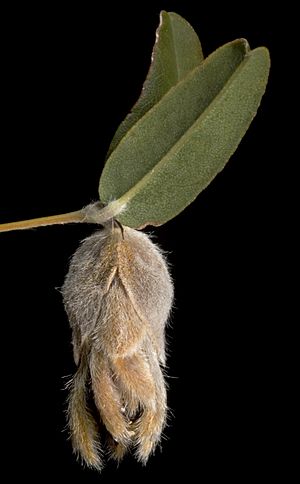Gastrolobium formosum facts for kids
Quick facts for kids Gastrolobium formosum |
|
|---|---|
 |
|
| Conservation status | |
| Scientific classification |
|
| Kingdom: | Plantae |
| Clade: | Tracheophytes |
| Clade: | Angiosperms |
| Clade: | Eudicots |
| Clade: | Rosids |
| Order: | Fabales |
| Family: | Fabaceae |
| Genus: | Gastrolobium |
| Species: |
G. formosum
|
| Binomial name | |
| Gastrolobium formosum (Kippist ex Lindl.) G.Chandler & Crisp
|
|
| Script error: The function "autoWithCaption" does not exist. | |
| Synonyms | |
|
Cryptosema pimeleoides Meisn. |
|
Script error: No such module "Check for conflicting parameters".
The Gastrolobium formosum is a special plant found in Western Australia. It's a small shrub that grows close to the ground, often reaching about one metre (about 3 feet) tall. This plant is part of the pea family, known as Fabaceae.
You can spot this shrub by its pretty red flowers. It likes to grow in wet places. You'll often find it in swamps or along the edges of rivers. It prefers soils like clay and loam.
Contents
What Does Gastrolobium formosum Look Like?
This plant is a trailing shrub, meaning its stems spread out along the ground. It has bright red flowers that grow in a unique way.
Its Special Flowers
The flowers of Gastrolobium formosum grow in small groups. Each group has four flowers that don't have individual stalks. These flower groups are wrapped by a circle of large, leaf-like structures called bracts.
The petals of the flowers are somewhat hidden. They are partly covered by the lower parts of the calyx, which is the outer part of the flower. One of its petals, called the standard petal, is quite small. It's less than one-third the size of another petal called the keel petal.
Where Does This Plant Grow?
Gastrolobium formosum is native to the southwest part of Western Australia. This means it naturally grows only in that specific region. It's an important part of the local plant life there.
Its Preferred Habitat
This shrub thrives in moist environments. It's commonly found in swamps, which are wetlands with trees and shrubs. You can also see it growing along the banks of rivers. The soil it likes best is clay or loam, which are types of rich, fertile earth.
How Was This Plant Named?
The name Gastrolobium formosum has an interesting history. Scientists often change plant names as they learn more about them.
The Meaning of Formosum
The second part of its name, formosum, comes from a Latin word. The Latin word is formosus -a, -um. This word means "well-formed," "handsome," or "beautiful." So, its name basically means "beautiful Gastrolobium."
Its Naming History
This plant was first described by a scientist named Richard Kippist in 1847. He first called it Jansonia formosa. He gave a more detailed description of it in 1851.
Later, in 2002, a group of scientists decided to move it to a different genus. These scientists were Chandler, Crisp, Cayzer, and Bayer. They moved it into the genus Gastrolobium. This is why its full scientific name today is Gastrolobium formosum.
 | Calvin Brent |
 | Walter T. Bailey |
 | Martha Cassell Thompson |
 | Alberta Jeannette Cassell |


